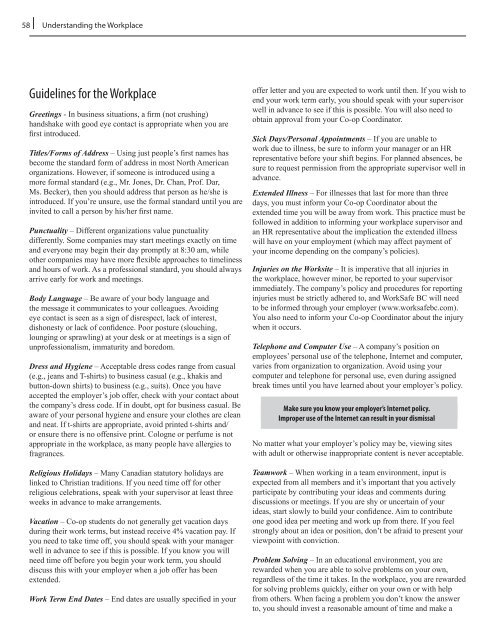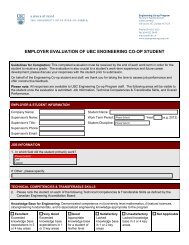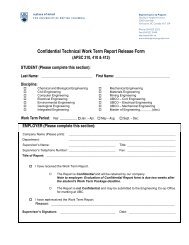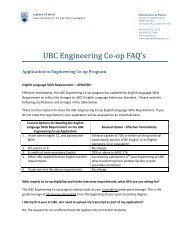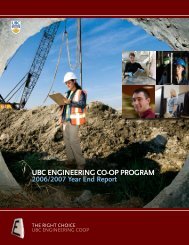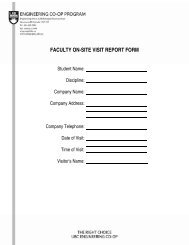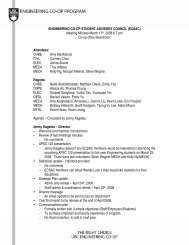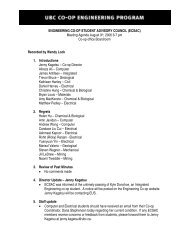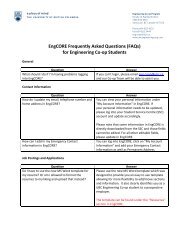ENGINEERING CO-OP PROGRAM
Download - Engineering Co-op Office - University of British Columbia
Download - Engineering Co-op Office - University of British Columbia
- No tags were found...
You also want an ePaper? Increase the reach of your titles
YUMPU automatically turns print PDFs into web optimized ePapers that Google loves.
58 Understanding the Workplace<br />
Guidelines for the Workplace<br />
Greetings - In business situations, a firm (not crushing)<br />
handshake with good eye contact is appropriate when you are<br />
first introduced.<br />
Titles/Forms of Address – Using just people’s first names has<br />
become the standard form of address in most North American<br />
organizations. However, if someone is introduced using a<br />
more formal standard (e.g., Mr. Jones, Dr. Chan, Prof. Dar,<br />
Ms. Becker), then you should address that person as he/she is<br />
introduced. If you’re unsure, use the formal standard until you are<br />
invited to call a person by his/her first name.<br />
Punctuality – Different organizations value punctuality<br />
differently. Some companies may start meetings exactly on time<br />
and everyone may begin their day promptly at 8:30 am, while<br />
other companies may have more flexible approaches to timeliness<br />
and hours of work. As a professional standard, you should always<br />
arrive early for work and meetings.<br />
Body Language – Be aware of your body language and<br />
the message it communicates to your colleagues. Avoiding<br />
eye contact is seen as a sign of disrespect, lack of interest,<br />
dishonesty or lack of confidence. Poor posture (slouching,<br />
lounging or sprawling) at your desk or at meetings is a sign of<br />
unprofessionalism, immaturity and boredom.<br />
Dress and Hygiene – Acceptable dress codes range from casual<br />
(e.g., jeans and T-shirts) to business casual (e.g., khakis and<br />
button-down shirts) to business (e.g., suits). Once you have<br />
accepted the employer’s job offer, check with your contact about<br />
the company’s dress code. If in doubt, opt for business casual. Be<br />
aware of your personal hygiene and ensure your clothes are clean<br />
and neat. If t-shirts are appropriate, avoid printed t-shirts and/<br />
or ensure there is no offensive print. Cologne or perfume is not<br />
appropriate in the workplace, as many people have allergies to<br />
fragrances.<br />
Religious Holidays – Many Canadian statutory holidays are<br />
linked to Christian traditions. If you need time off for other<br />
religious celebrations, speak with your supervisor at least three<br />
weeks in advance to make arrangements.<br />
Vacation – Co-op students do not generally get vacation days<br />
during their work terms, but instead receive 4% vacation pay. If<br />
you need to take time off, you should speak with your manager<br />
well in advance to see if this is possible. If you know you will<br />
need time off before you begin your work term, you should<br />
discuss this with your employer when a job offer has been<br />
extended.<br />
Work Term End Dates – End dates are usually specified in your<br />
offer letter and you are expected to work until then. If you wish to<br />
end your work term early, you should speak with your supervisor<br />
well in advance to see if this is possible. You will also need to<br />
obtain approval from your Co-op Coordinator.<br />
Sick Days/Personal Appointments – If you are unable to<br />
work due to illness, be sure to inform your manager or an HR<br />
representative before your shift begins. For planned absences, be<br />
sure to request permission from the appropriate supervisor well in<br />
advance.<br />
Extended Illness – For illnesses that last for more than three<br />
days, you must inform your Co-op Coordinator about the<br />
extended time you will be away from work. This practice must be<br />
followed in addition to informing your workplace supervisor and<br />
an HR representative about the implication the extended illness<br />
will have on your employment (which may affect payment of<br />
your income depending on the company’s policies).<br />
Injuries on the Worksite – It is imperative that all injuries in<br />
the workplace, however minor, be reported to your supervisor<br />
immediately. The company’s policy and procedures for reporting<br />
injuries must be strictly adhered to, and WorkSafe BC will need<br />
to be informed through your employer (www.worksafebc.com).<br />
You also need to inform your Co-op Coordinator about the injury<br />
when it occurs.<br />
Telephone and Computer Use – A company’s position on<br />
employees’ personal use of the telephone, Internet and computer,<br />
varies from organization to organization. Avoid using your<br />
computer and telephone for personal use, even during assigned<br />
break times until you have learned about your employer’s policy.<br />
Make sure you know your employer’s Internet policy.<br />
Improper use of the Internet can result in your dismissal<br />
No matter what your employer’s policy may be, viewing sites<br />
with adult or otherwise inappropriate content is never acceptable.<br />
Teamwork – When working in a team environment, input is<br />
expected from all members and it’s important that you actively<br />
participate by contributing your ideas and comments during<br />
discussions or meetings. If you are shy or uncertain of your<br />
ideas, start slowly to build your confidence. Aim to contribute<br />
one good idea per meeting and work up from there. If you feel<br />
strongly about an idea or position, don’t be afraid to present your<br />
viewpoint with conviction.<br />
Problem Solving – In an educational environment, you are<br />
rewarded when you are able to solve problems on your own,<br />
regardless of the time it takes. In the workplace, you are rewarded<br />
for solving problems quickly, either on your own or with help<br />
from others. When facing a problem you don’t know the answer<br />
to, you should invest a reasonable amount of time and make a


